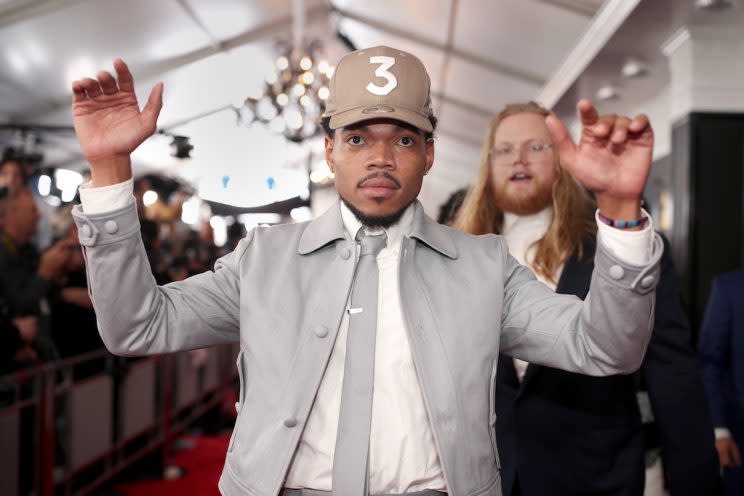How Chance the Rapper got big without a record deal
Chance the Rapper made history at the 59th Grammy Awards, snagging three awards without selling a single physical copy of his music. The 23-year-old is an independent artist, untethered from the whims of a record label — further proof he’s doing things his way.
“I think…the idea of somebody owning the recording of your music…I think there’s a lot of attention on me not signing a record deal. But I also don’t believe in publishing deals or most of the traditional upper management style of music being distributed. I think whoever makes [the music] should have a say in when they release it, what they release, how much it costs,” Chance the Rapper told Yahoo Global News Anchor Katie Couric in an interview last week.
Chance was only eligible for a Grammy because The Recording Academy updated its rules last year to include streaming-only services for the awards. His third mixtape, “Coloring Book,” which garnered widespread acclaim, was released exclusively on Apple (AAPL) Music.
Of course, he acknowledges the challenges that come with eschewing a record label, like having a tough time topping the charts or getting played on the radio.
“For a long time, I think I missed out on a lot of opportunities, because I was kinda in a rat race where everybody else just had a boost. But it’s becoming more and more recognized that everyone starts out as an unsigned artist…and being signed doesn’t necessarily make you more validated as an artist,” he said.

ESCHEWING THE 360 DEAL
360 deals, or contracts that allow record labels to receive a percentage of the earnings from all of an artist’s activities (not just record sales), gained a lot of traction in the 1990s and 2000s, according to Chance.
“For a new artist the 360 deal is like a ‘double edged sword.’ A ‘hungry’ artist would love to be signed to any major record label; but if you have to include the label in on additional income you make, an artist is putting more money in the label’s pockets than in their own bank accounts. If a music client is offered a 360 deal, advise them and counsel them to make the choice that is best for their career in the long term, and of course negotiate, negotiate, and negotiate,” Tiffany Simmons-Rufus explains in “An Overview of the 360 Deal” for The American Bar Association.
For his part, Chance doesn’t see the benefit in compromising his own interests for the sake of the label’s.
“[In a 360 deal], the artist is completely owned by a label…I don’t like being owned. That’s not my thing. That’s not what I’m into,” he told Couric.
And, because he’s so passionate on the topic, he’s encouraged his peers to go independent as well. Following suit, his fellow artists Frank Ocean and Lupe Fiasco have ditched their record deals.
“I get to choose how much my music costs. I get to choose when my music gets released. I choose when I go on tour, who I work with, what movies I work with,” he said.
HOW DOES CHANCE MAKE MONEY?
By bypassing any complicated relationship with a record label, Chance said he has bolstered his relationship with consumers. The rapper’s independence has made Chance’s fans that much more loyal, and they often support him through his merchandise shop — his main source of revenue.
Chance’s signature “3” New Era Cap retails for $45 each and his $50 “No Problem” and “Coloring Book” hoodies have become ubiquitous among teens and adults alike.
In addition to his paraphernalia, Chance also makes money from concert tickets, of course. He has nearly 40 shows scheduled for his spring tour starting in April.
Though Chance “thinks about [signing] all the time,” he remains steadfast in his quest for creative freedom.
Melody Hahm is a writer at Yahoo Finance, covering entrepreneurship, technology and real estate. Follow her on Twitter @melodyhahm.
Read more:
Why one Apple expert says to look beyond the iPhone
How one startup is trying to redefine the IPO
Snapchat’s crackdown on content sets itself apart from Facebook and Twitter
Shark Tank’s Daymond John: If you’re a scared entrepreneur, you’re dead already
